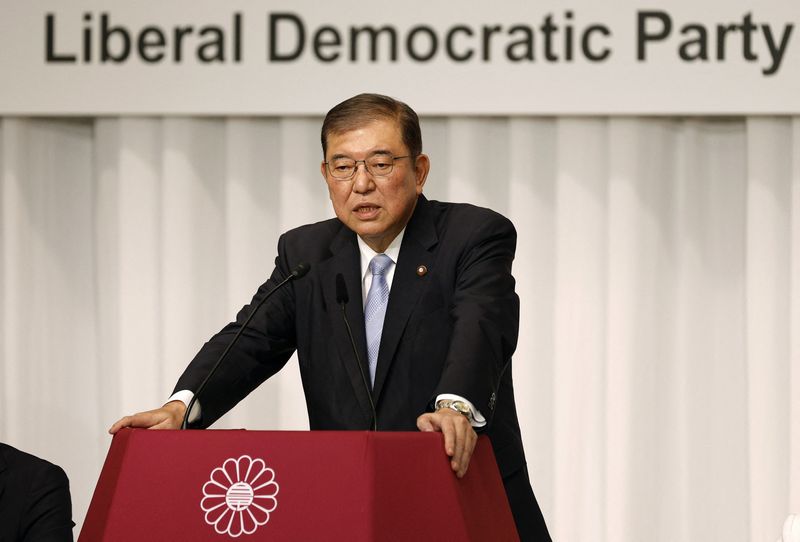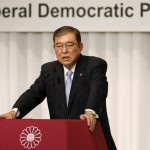TOKYO (Reuters) -Japan’s next prime minister, Shigeru Ishiba, says he reads three books a day and would rather do that than mingle with the ruling party colleagues who picked him as their new leader on Friday.
The 67-year-old’s successful leadership bid after four failed attempts puts the self-professed lone wolf at the helm of a Liberal Democratic Party that has ruled Japan for most of the past seven decades.
Ishiba takes over with the party in crisis, having seen its public support ebb away over the past two years with revelations of links to a church branded a cult by critics and a scandal over unrecorded donations.
A former defence minister who entered parliament in 1986 after a short banking career, Ishiba was sidelined by previous premiers including outgoing Prime Minister Fumio Kishida, becoming instead a dissenting voice in the party.
He has rebelled on policies including the increased use of nuclear energy and has criticised his party for not allowing married couples to use separate surnames.
“I have undoubtedly hurt many people’s feelings, caused unpleasant experiences and made many suffer. I sincerely apologise for all of my shortcomings,” he told LDP lawmakers who gathered at party headquarters for the election, before his narrow triumph over hard-line nationalist Sanae Takaichi.
Launching his campaign at a Shinto shrine in rural Tottori prefecture, where his father was governor and where Ishiba began his political career at the height of Japan’s fast growing bubble economy, he told supporters this was his “final battle”.
Ishiba, who has also served as agriculture minister, promised to move some ministries and government agencies out of Tokyo to help revive Japan’s moribund regions. He has also proposed establishing an agency to oversee the construction of emergency shelters across disaster-prone Japan.
FRICTION
Ishiba’s outspoken views, including calls for Kishida to step down, have earned him enemies in the LDP.
That enmity, which also stems from a four-year defection to an opposition group in 1993, made it difficult for Ishiba to win the 20 nominations he needed from fellow lawmakers to qualify as a candidate in the election on Friday.
His lack of popularity among lawmakers means that Ishiba has had to rely on the support he has nurtured among rank-and-file members over his four decades in politics.
He has stayed in the public eye during his time away from government with media appearances, social media posts and on YouTube, where he muses on topics ranging from Japan’s falling birthrate to ramen noodles.
He also pokes fun at himself, including his sometimes-awkward manner and hobbies including plastic models of ships and military aircraft, some of which he displays on the bookshelves that line his parliamentary office in Tokyo.
U.S. DIPLOMACY
Seen as an LDP intellectual heavyweight and expert on national security policy, he advocates for a more assertive Japan that can reduce its reliance on longtime ally, the U.S., for its defence.
That position, analysts say, could complicate relations with Washington.
During the LDP leadership campaign, he called for Japan to lead the creation of an “Asian NATO”, an idea quickly rejected by Washington as too hasty.
In Okinawa where most of the U.S. troops in Japan are concentrated, he said he would seek greater oversight of the bases they use. He also wants Washington to give Japan a say in how it would use nuclear weapons in Asia.
In an interview with Reuters, Ishiba also criticised the U.S. political backlash to Nippon Steel’s bid for U.S. Steel, saying it unfairly cast Japan as a national security risk. Kishida has avoided making comments on the issue ahead of the U.S. presidential election.
POLICY SHIFTS
Ishiba has, however, softened some policy positions that have put him at odds with party colleagues, most notably saying he would keep some reactors operating in Japan, despite his past opposition to nuclear power and support for renewable energy sources.

A fiscal conservative who has promised to respect the independence of the Bank of Japan to set monetary policy, he has more recently said it is unclear whether conditions were right for a fresh hike in interest rates.
“Politicians don’t need to be best friends, as long as their policies and political positions match,” Ishiba said in a video posted on YouTube this week.
To read the full article, Click Here

